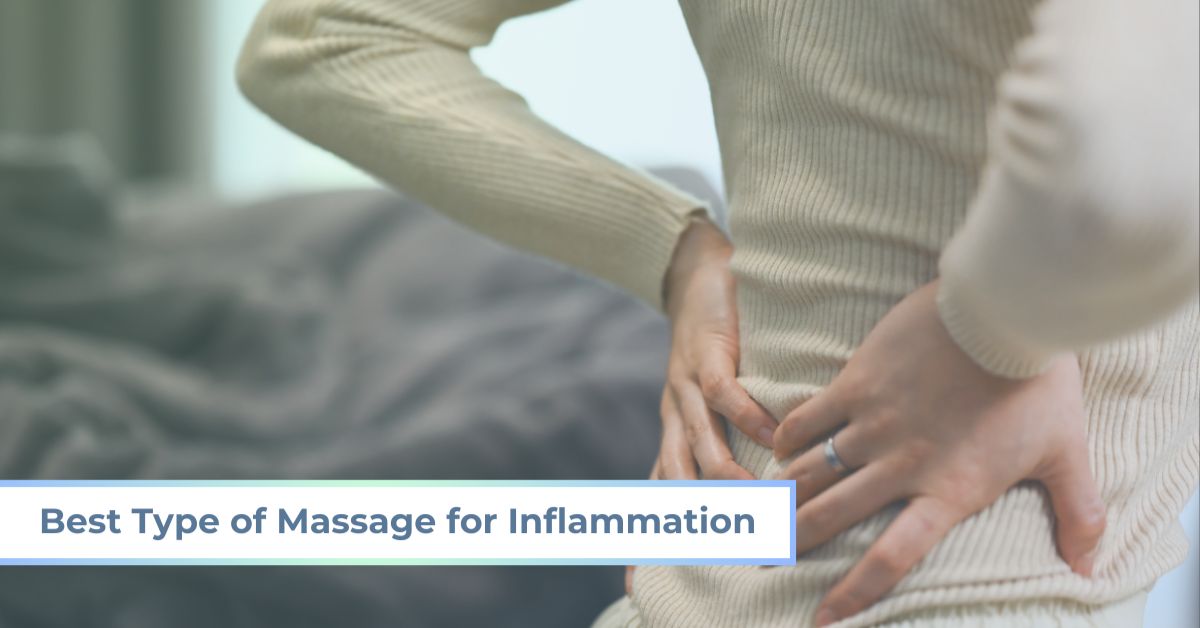
Inflammation is the body’s natural response to injury or illness, but when it becomes chronic, it can lead to discomfort and long-term health issues. Massage therapy offers a holistic approach to managing inflammation, helping to reduce pain and improve overall well-being. Regular sessions can provide targeted relief and support the body’s natural healing processes.
Understanding Inflammation: What It Is and Why It Matters
Inflammation occurs when the body’s immune system reacts to an irritant, such as an injury, infection, or toxin. While acute inflammation is a necessary healing process, chronic inflammation can contribute to various health problems, including arthritis, muscle stiffness, and fatigue. Recognizing and managing inflammation is key to maintaining long-term health and mobility.
How Massage Therapy Helps with Inflammation
Massage therapy promotes relaxation, improves circulation, and reduces stress—all of which play a role in lowering inflammation. By targeting specific areas of tension, massage can alleviate symptoms and enhance recovery. Improved blood flow delivers oxygen and nutrients to affected areas while flushing out toxins, supporting overall wellness.
Best Types of Massage for Inflammation Relief
 Lymphatic Drainage Massage: Promoting Detoxification
Lymphatic Drainage Massage: Promoting Detoxification
This gentle technique encourages the natural drainage of lymph, helping to remove toxins and reduce swelling associated with inflammation. It’s particularly effective for individuals recovering from surgery or illness.
Deep Tissue Massage: Targeting Muscle Layers
Deep tissue massage focuses on the deeper layers of muscles and connective tissues, making it effective for chronic inflammation and tension relief. It’s ideal for targeting deep-seated pain caused by repetitive strain or injury.
Myofascial Release: Relieving Connective Tissue Tension
Myofascial release targets the fascia, the connective tissue surrounding muscles, to release tension and improve mobility. This technique is particularly beneficial for those experiencing stiffness or limited movement due to chronic inflammation.
Swedish Massage: Gentle Techniques for Acute Inflammation
Swedish massage employs gentle, flowing strokes to promote relaxation and reduce inflammation in acute cases, such as post-injury swelling. Its calming approach also helps lower stress, a contributing factor to inflammation.
Hot Stone Massage: Combining Heat and Therapy
Hot stone massage uses heated stones to relax muscles and improve circulation, providing relief from stiffness and inflammation. The warmth enhances muscle flexibility, making it ideal for individuals with chronic pain.
Trigger Point Therapy: Addressing Specific Pain Points
Trigger point therapy focuses on releasing tight knots that can cause referred pain and inflammation. Targeting these specific points, it provides immediate and localized relief.
The Science Behind Massage for Inflammation
How Massage Reduces Inflammatory Markers
Studies show that massage can lower levels of cytokines, and proteins linked to inflammation, reducing pain and swelling effectively. This makes it a valuable tool for managing chronic conditions.
The Role of Improved Circulation
Improved blood flow from massage helps deliver oxygen and nutrients to affected areas while removing waste products that contribute to inflammation. Enhanced circulation supports the body’s healing process and reduces discomfort.
Stress Reduction and Its Impact on Inflammation
Stress is a known contributor to chronic inflammation. Massage therapy reduces cortisol levels, promoting relaxation and lowering inflammatory responses. Regular sessions can improve both physical and emotional well-being.
Factors to Consider When Choosing a Massage for Inflammation
Your Condition and Symptoms
Consider the severity and type of inflammation, whether it’s acute or chronic, to select the most appropriate massage technique. Acute cases may benefit from gentler approaches like Swedish massage, while chronic conditions may require deeper techniques.
Your Comfort Level with Massage Techniques
Some techniques, like deep tissue massage, involve firm pressure, while others, such as Swedish massage, are more gentle. Choose based on your comfort and tolerance to ensure a positive experience.
Consultation with a Professional Therapist
A trained therapist can assess your condition and recommend a massage style tailored to your needs. Open communication about your symptoms and preferences ensures the best results.
Preparing for Your Anti-Inflammatory Massage
Before the Massage
- Stay Hydrated: Support lymphatic function by drinking water before your session. Proper hydration also helps improve muscle responsiveness during the massage.
- Communicate Symptoms: Share your concerns and preferences with your therapist. This ensures a tailored session that addresses your specific needs.
- Avoid Heavy Meals: Ensure comfort during the massage by eating lightly beforehand. A lighter meal helps prevent discomfort while lying down.
Post-Massage Care
- Drink Plenty of Water: Aid toxin removal and prevent soreness. Staying hydrated also supports faster muscle recovery.
- Rest: Avoid strenuous activities to let your body recover fully. Taking it easy helps prolong the relaxation and benefits of the massage.
- Follow Recommendations: Adhere to aftercare advice for long-lasting results. Your therapist’s guidance will help maintain the effects of the session.
The Convenience of Mobile Massage for Inflammation Relief
Mobile massage services offer a stress-free way to prioritize your health by bringing professional care directly to your home. Especially for those managing inflammation, this option eliminates the hassle of travel while ensuring personalized, high-quality care.
Why Mobile Massage Is Perfect for Those with Inflammation
Mobile massage services provide care in the comfort of your home, minimizing the stress and effort associated with travel. This convenience is especially beneficial for individuals with inflammation, as it allows them to relax fully and focus on recovery without added strain.
Blys Mobile Massage: A Tailored Solution
Blys offers mobile massage services designed to address inflammation effectively. Their professional therapists deliver personalized care directly to you, tailoring each session to your specific needs and conditions.
With Blys, you can enjoy expert care without ever leaving your home, making self-care more accessible and stress-free.
Frequently Asked Questions (FAQs)
Managing inflammation with massage therapy often raises questions about the best techniques, safety considerations, and recommended frequency.
Here are answers to some common inquiries to help you make informed decisions and get the most out of your massage experience.
1. What Is the Best Massage for Arthritis-Related Inflammation?
Lymphatic drainage and Swedish massages are excellent for managing arthritis-related swelling and discomfort. These techniques reduce inflammation gently while improving circulation and mobility.
2. Can Massage Help with Post-Surgery Swelling?
Yes, techniques like lymphatic drainage massage can reduce post-surgery swelling and promote faster recovery. This gentle approach supports healing by enhancing fluid drainage and minimizing discomfort.
3. Are There Any Risks Associated with Massage for Inflammation?
While generally safe, certain conditions, such as active infections or severe inflammation, may require caution. Always consult a healthcare provider or therapist beforehand to ensure a safe and beneficial session.
4. How Often Should I Get a Massage for Chronic Inflammation?
Weekly or bi-weekly sessions are often recommended for chronic inflammation, depending on your condition and response to therapy. Regular massages help manage symptoms and prevent flare-ups effectively.





